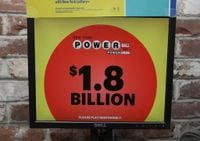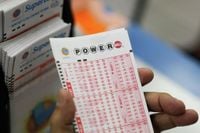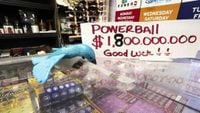On September 6, 2025, the Powerball lottery delivered a jolt of excitement across the United States as two fortunate players—one in Missouri and another in Texas—matched all six numbers to claim a staggering $1.8 billion jackpot. The drawing ended a remarkable three-month stretch in which no player had managed to snag the top prize, despite millions of hopefuls lining up at gas stations, convenience stores, and grocery counters from coast to coast. The winning numbers—11, 23, 44, 61, 62, and the Powerball 17—now stand etched in lottery history as the digits that changed two lives forever and marked the second-largest jackpot ever awarded in the nation.
According to officials cited by UPI and the Associated Press, the odds of matching all six numbers were an astronomical 1 in 292.2 million. Yet, against all probability, the Missouri and Texas ticket holders defied the math, splitting a pot that had ballooned through 41 consecutive drawings without a winner. The last time someone claimed the Powerball jackpot was back on May 31, 2025, making this victory all the more dramatic for lottery enthusiasts and statisticians alike.
The $1.8 billion sum is nothing short of life-changing, but the actual payout depends on how the winners choose to receive their windfall. As reported by CBS News and The New York Post, the annuity option would dole out the full amount in 30 payments over 29 years, providing a steady stream of income that increases by 5% annually. However, most winners opt for the lump sum cash option, which, for this drawing, is estimated at $826.4 million before taxes. That’s a jaw-dropping payday by any measure, though the final amount will shrink once federal and, in many cases, state taxes are deducted. Federal withholding takes 24% off the top immediately, with another 13% due when winners file their 2025 tax returns. State tax rates vary, with some states—like Texas—imposing no tax at all on lottery winnings, while others may take up to 10.9%.
Powerball, a fixture of American culture since its first drawing in 1992, is played in 45 states, Washington, D.C., Puerto Rico, and the U.S. Virgin Islands. Tickets cost $2 each, and drawings are held every Monday, Wednesday, and Saturday from a studio in Tallahassee, Florida. The game’s design, with its daunting odds, is deliberate—by making it so difficult to win, jackpots roll over and grow, fueling ticket sales and public anticipation. As Jonathan D. Cohen, author of For a Dollar and a Dream: State Lotteries in Modern America, explained to the Associated Press, lotteries in the U.S. have long been a way for governments to raise funds without raising taxes. "They were born out of a distinctly American desire for government services without paying taxes for them," Cohen said.
While the jackpot headlines grab attention, Powerball also doles out millions in smaller prizes each drawing. In this latest event, two players in Kansas and Texas matched all five white balls plus the Power Play, earning $2 million each. Another 18 players matched all five white balls (but not the red Powerball), winning $1 million apiece. The odds of winning any prize, even a modest one, are far better than those for the jackpot—about 1 in 24.87, according to the official Powerball website.
The September 6 draw’s sheer scale puts it firmly among the most memorable moments in American lottery lore. Only the $2.04 billion jackpot won by Edwin Castro in California on November 7, 2022, ranks higher. Castro’s win, which he claimed in early 2023, ended months of speculation and media frenzy. As with that historic win, the latest Powerball drawing once again stirred debate about the visibility and privacy of lottery winners. In Texas and Missouri, both of which allow winners to remain anonymous, the new multi-millionaires can choose to keep their identities secret. According to UPI and the Associated Press, nine states permit complete anonymity for all lottery prizes, while ten others allow it for winnings above certain thresholds. In some states, winners can claim prizes through trusts, further shielding their identities.
The question of anonymity is more than just a curiosity—it’s a matter of personal safety and public trust. Attorney Mark K. Harder, who claimed an $842.4 million jackpot in 2024 on behalf of a Michigan couple, told the Associated Press that his clients wanted to maintain their privacy and "be perceived the way they had always been perceived." The couple even hired a public relations team to scrub their social media profiles, hoping to avoid unwanted attention or risk. The caution is understandable, given the cautionary tales of past winners. Andrew "Jack" Whittaker Jr., who won $113.4 million after taxes in 2002, became a national celebrity overnight but later faced scandals, lawsuits, and personal tragedy. He eventually lamented, "I wish I had torn up the ticket." Yet, as Cohen noted, most winners fare better, often becoming wealthier and healthier than non-winners.
States, for their part, have a vested interest in transparency. Publicizing winners’ names is seen as a bulwark against fraud and insider manipulation. "You don't want the lottery director's nephew to win every jackpot and just claim it anonymously and nobody knows who it is," Cohen said. Still, mechanisms exist to ensure fairness, such as requiring winners’ names be disclosed to lottery commissions even if they’re not made public. The debate over privacy versus transparency shows no sign of abating, especially as jackpots continue to soar and the stakes grow ever higher.
The Powerball’s enduring popularity is a testament to the American dream—however improbable it may be. Millions of players, from seasoned regulars to first-time hopefuls, chase the fantasy of instant riches every week. As reported by the Houston Chronicle and other outlets, tickets can now be purchased not only at traditional retailers but also online in some states, making it easier than ever to join the fray. The drawings themselves are broadcast live online and on local television, turning each event into a communal spectacle. The fever pitch reached by the $1.8 billion jackpot is unlikely to fade soon, especially as Mega Millions and other games continue to push the boundaries of what’s possible.
For now, the Missouri and Texas winners—whether they choose to step into the spotlight or remain anonymous—have secured their place in lottery history. Their stories, and the dreams they inspire, will ripple through communities and conversations for months to come.



